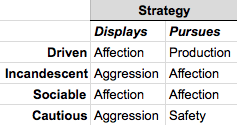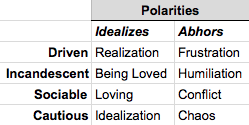This is an advance-look chapter from the book I’m working on now, “Shyly’s delight: Work, play and love like a Labrador.” It’s about illimitable joy, so I’ll tease you with some observations about pain. —GSS

Find the love for life your dog never lives a day without at Amazon.com:Shyly’s delight: Work, play and love like a Labrador.
It’s all right here in this chart:

Incandescents make their greetings aggressively – often with a sneer or a snub – in pursuit of a distant admiration. Claudius begins by using veiled aggression in pursuit of the affections of Queen Gertrude and the people, but he ends using nothing but naked aggression against everyone, throwing anyone else – including Gertrude in the end – onto the pile of corpses to save his own skin.
Why does DISC matter in your real life? For one thing, because just like Claudius, every Prom King, every Queen Bee, every idol of the Incandescents, must eventually become the monster. When either of the aggressive strategies, Incandescent or Cautious, is dominant and where escapes to alternatives are blocked, the social environment will come over time to resemble a prison camp.
Why are you not dancing like Shyly in your life at home or at work?

Are you Mister Driven married to Missus Cautious? She’s always wasting time over-preparing, he contends, while she thinks he’s always going off half-cocked. Who is wrong? Neither one. They just count their wealth in different currencies. He wants it done even if it’s not perfect, where she wants it perfect even if it’s not done.
Why did your top sales rep just up and quit? You praised him quietly, with more money but with no acclaim, and then you made a big ugly public scene about the one account he lost. You paid him nothing he wanted and everything he hated.
How is it that the warmest, most giving people are always so quick to stop coming to the Parent-Teacher Association meetings? It’s all in that chart: When you give people the things they love, they love you for it. When you give them nothing but what they hate, they hate you for it.
And when you block their escape…

Most authentic, guile-free conflicts originate in dyspossibility, I think. That’s a word I made up. It refers to the socially-unattainable value, the thing that I want most from other people that I can never get from them in sufficient quantity – the thing that makes me dissatisfied with another person not for any valid cause, but simply because he can never live up to my ideal for him – not even if he is my own DISC type, not even if my standards for myself are not nearly so exacting. My dyspossible need could only be met if it were met in unlimited quantity, and that objective is impossible in every way you might try to think about it.
But what the idea of dyspossibility means is that I will be low-grade unhappy with all of my relationships unless I remind myself constantly that the people I love are doing their best for me, just as I am for them – and we’re all of us too often counting what’s missing from the goody bag of love stuff, rather than rejoicing in what’s there.
Just that much is a mistake that Shyly would never make, so don’t say a dumb dog has nothing to teach you.
But watch every social engine you know of go off the rails: The annoyance over the dyspossible is expressed by the repulsive act – the way I have of expressing my displeasure over the dyspossible. This will typically be followed by a short or long round of mutually-repulsive ping-pong – often expressed in the way the other party will find most abhorrent. And after a while, the quarrels are not quite as authentic, either – coming up as grudge-encrusted continuations of past skirmishes – nor as free of guile.
Kiss and make up? That’s the impulsion strategy: How do I impel you back into my arms? Sociables do it with love, Drivens with gifts as cyphers for love. If the Incandescent and Cautious strategies of withholding affection to win loyalty seem incoherent here, consider the suckers – the Sociables – who yield to this punishment.
Enough’s enough already? The break-up strategy is there.
But so is the prison camp. A Cautious tyranny emerges when the social machine – family, job, school, church, club – is under Cautious control. A Cautious tyranny sustains itself by blocking escape – to flee a perfectly-planned paradise is not simply apostasy but insanity, for one thing, plus it calls the whole ‘perfectly-planned paradise’ idea into question – and Sociables break-up by reconciliation.
How do Sociables, considered as a type, so often end up being metaphorically imprisoned by the monster? Human beings have free will because, unlike dogs, they are capable of recognizing that a collar denotes captivity and a leash slavery – and capable of responding accordingly, by flight if possible, by rebellion if not. Sociables are poor at recognizing the collars and leashes the Incandescents and Cautious like to adorn them in. Moreover, their goal in their relationships is to keep them together at all costs. Accordingly, they don’t think to run away until the cost of doing so is too high to bear.















